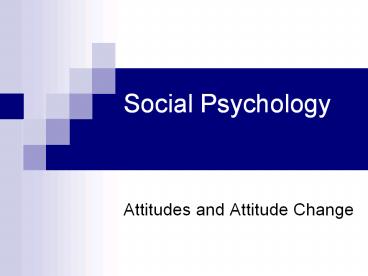Social Psychology PowerPoint PPT Presentation
1 / 25
Title: Social Psychology
1
Social Psychology
- Attitudes and Attitude Change
2
Attitudes
- Enduring orientations with cognitive, affective,
and behavioral components. - Cognitive
- Affective
- Behavioral
- A favorable or unfavorable evaluative reaction
toward something or someone, exhibited in ones
beliefs, feelings or intended behavior
3
Attitude Development
- External Stimuli
- The Target
- Intervening Processes
- The Response
4
Intervening Process Learning
- Attitudes as Habits Carl Hovland (1953)
- Processes
- Association
- Reinforcement
- Imitation
5
Association
- Message Learning
- Weak relationships
- Motivation
- Transfer of Affect
- Associations between two objects
6
Reinforcement
- Rewarded for attitudes that fit with values of
group, society, culture - May initially change behavior
- Then accept the underlying value
7
Reinforcement Incentive Theory
- Adopt attitude that maximizes gains
- Consider importance and value
- Cognitive response theory
- Respond to proposition with thoughts attitude
- Expectancy value theory
- Consider likelihood value
8
Imitation
- Model our behaviors (and related attitudes) after
others - Aronson OLeary
- Water conservation
- Cialdini
- Littering
9
Intervening Process Cognitive Consistency
- Gestalt influence Seek coherence
- Attitudes must be interpreted in context
- Balance theory (Heider, 1958)
- Cognitive dissonance (Festinger, 1957)
10
Balance Theory
- Key
- P Person (self)
- O Other
- X Attitude Object (issue, person, etc.)
- Unit or Sentiment Relations
- sign Link/Like
- - sign No Link/Dislike
- Triads can be
- Balanced signs multiply to positive ()
- Unbalanced signs multiply to negative (-)
or -
P
O
or -
or -
X
11
Cognitive Dissonance (Leon Festinger)
- Cognitions can have 3 relations
- Irrelevant
- Consonant
- Dissonant
12
Dissonance
- Dissonance A feeling of discomfort that is
caused by holding 2 or more inconsistent
cognitions - Dissonance and importance
13
How do you get rid of it?
- How do you restore a sense of consistency?
- Change your behavior
- To be consistent
- To compensate
- Change your cognitions
- Add consonant cognitions (mis-remember things,
rationalize your behavior) - Alter importance of cognitions
14
Cognitive Dissonance Theory Study Example
(Festinger Carlsmith, 1959) Insufficient
Justification
- Participants are asked to engage in a very boring
task - After that, they either
- Were told the study was over
- Were paid 1 to lie to another participant about
the task - Were paid 20 to lie to another participant about
the task - Then, participants (real) attitudes about the
task were measured
15
Applications
- Therapy
- Cults
- Festinger When Prophecy Fails
- Daily situations
16
Self Perception Theory
- Bem (1972)
- Rational cognitive process
- Behaviorist
- Infer attitudes for others
- Zanna Cooper (1974)
17
Consistency Reactions to Discrepancy
- Modes of resolution
- Derogating the source
- Distorting the message
- Blanket Rejection
18
Elaboration Likelihood Model(Petty Cacioppo,
1986)
- Two routes
- Central
- Based on thoughtful consideration of facts
- Peripheral
- Based on thoughtless affective evaluations
- Leads to acceptance of weak messages
- Route depends on motivation opportunity
19
Controlling Cognitive Responses
- Counterarguing
- Active processing
- Implicit or explicit
- Verbal or nonverbal
- Depends on quantity and quality
20
ELM Communicator
- Credibility
- Expert
- Trustworthy
- Reciprocity
- Reference
21
ELM Communication
- Discrepancy
- Motive arousal
- Anger
- Fear
22
ELM Target
- Ego involvement
- Commitment
- Issue involvement
- Response involvement
- Defense McGuire
- Supportive
- Inoculation
23
ELM Situation
- Forewarning of position
- Forewarning of intent
- Distraction
24
Cults
- Changed norms
- Gradual
- Powerful leader
- Unquestioned authority
25
Applications
- War
- Token economies
- Presentations
- Office politics

